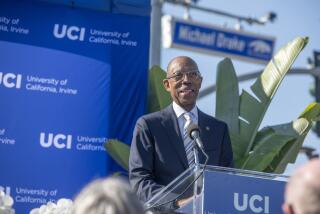McDonald ‘Dream House’ raffle raises eyebrows
- Share via
It’s a dream house raffle without a dream house.
For 12 years, the local Ronald McDonald House Charities has held a “Dream House Raffle” in which a luxury mansion is advertised as the game’s grand prize for the price of a $100 or more ticket.
Yet, the respected nonprofit almost never gives away the home because it often doesn’t sell enough tickets to make it the main prize.
This year, a $3 million Poway mansion was the top reward. But, prize rules said 61,200 tickets had to be sold by April 29 for the charity to offer the house. The organization said it was roughly 11,000 tickets short.
The raffle still produces other winners who get huge cash payouts and prizes. But in the 12 years of the raffle, the charity has only sold enough tickets to award the house three times. And in that time, only one person has chosen to claim the house. (Others preferred to take the cash value per raffle rules.)
Charles Day, CEO of the Ronald McDonald House Charities of San Diego, said the raffle gives away more than 1,300 prizes and they are up front with contestants about the rules.
“Each participant agrees to the raffle rules on the ticket purchasing form, which states that we must sell a certain number of tickets to make the house available,” he said.
Proceeds from the raffle go toward the organization’s mission to provide bedrooms and meals for families with very sick children receiving hospitalized care. It raised $7.3 million in 2014, $5.4 million in 2013, $5.6 million in 2012 and $5 million in 2011, according to tax records.
Not everyone agrees with the charity’s fundraising strategy.
Daniel Borochoff, founder and president of Chicago-based CharityWatch, said it would be more ethical for the nonprofit to find a cheaper house to potentially avoid misleading raffle participants.
“The charity needs to make a good faith effort to be as accurate and clear in their solicitations or fundraising,” he said. “Only if you read the fine print, do you see they have a big loophole, a big out.”
Borochoff said the nonprofit has given itself an incentive not to sell more tickets because it will be less of a payout.
This year’s grand prize winner, April Teitelbaum of Carlsbad, was not upset that the mansion was not offered as part of the grand prize. She was awarded a hefty cash prize of either $1.3 million over 20 years or a one-time cash payment of $900,000. She declined to elaborate on her winnings but said she was “absolutely thrilled” with her prize.
If the house made the cut, she could have asked instead for $2.1 million over 20 years or a one-time cash payment of $1.4 million.
Other raffle prizes included a 2016 BMW M6 convertible, vacation for 10 to Italy, Bulova Ashton pocket watch, Sony Bluetooth stereo headset, Tiffany Signature earrings in 18 karat white gold with akoya pearls and diamonds and a 2016 Jaguar F-type convertible.
Another charity watchdog, New Jersey-based Charity Navigator, did not see an issue with the raffle. It said the Ronald McDonald House was following the law and its raffle seemed to be a successful way to raise money.
“It is not unusual for an organization to set a minimum before certain prizes are awarded,” said Leonie Giles, senior program analyst for Charity Navigator. “In addition, the rules are easily accessible and participants are still eligible for a number of prizes based on participation level.”
The Ronald McDonald House of Sacramento also does a dream house raffle with similar rules. This year’s contest required 35,000 raffle tickets to be sold for a dream house to be eligible.
This year’s dream house in Poway, which could have been won with a $150 raffle ticket, is now on the market for $3 million. Ronald McDonald House said owners of the 8,500-square-foot Tuscan-style estate agreed to take the property off the market during the raffle.
The property occupies 5.7 acres above the Maderas Golf Club and has five bedrooms and seven bathrooms. Features include a theater room, gourmet kitchen, billiards room, five-car garage, tennis court, putting green, a well on premises, vanishing edge salt water swimming pool and man-made waterfall.
The land the dream house is on was purchased by John and Meena Smith for $1.5 million in 2004 from Jeromy Burnitz, a former Major League Baseball player.
It was put on the market for $3.3 million in May after eligibility for the raffle was over, reducing in price several times since then.
[email protected] (619) 293-1891 Twitter: @phillipmolnar
More to Read
Sign up for Essential California
The most important California stories and recommendations in your inbox every morning.
You may occasionally receive promotional content from the Los Angeles Times.







